Redditor Asks If She's An A**hole For Not Cleaning Up After Her Grandmother's Six Dogs Who Like To "Poop Everywhere"
Dogs are incredibly smart animals, but if they're not trained correctly, they can be a handful. And if they're not toilet trained, well, let's just say you're in for a whole lot of cleaning.
Reddit user u/azbycxdwevguhtisjrkq recently posted in the AITA (Am I The A**hole?) subreddit about an issue she's having with her grandmother's dogs. She explained that her grandma has six dogs, and none of them are trained at all.
They all go to the bathroom in the house, and OP's grandma doesn't seem to clean up very well after them. The Redditor explained that she was taking care of the dogs for her grandma for two weeks.
When she arrived on the first day, there were already three piles of poop and four puddles of pee in the house. The OP says the dogs need to be watched closely when they go outside, and they will eat their poop if it's not picked up immediately.
And, in true doggy fashion, they will then share their poopy breath with everyone around them. The OP said that one of the dogs had snuck a frozen poop from outside into the house, ate it as a snack, and then vomited it up on the OP!
The Redditor says she can never sleep for more than three hours at a time when she's watching them because they will wake her up to go outside every few hours. But they still poop inside either way.
The OP says she does it to help her grandmother, as she can't afford to pay a professional. However, the OP refuses to clean up after the dogs any more thoroughly than her grandma does.
So, she picks up the poop, wipes up the pee, and leaves her shoes on at all times in the house. Her sister says she's an a**hole, but the OP argues that her grandmother doesn't do anything more than that.
Some of the dogs are wrinkly breeds and need their wrinkles cleaned regularly. However, it never gets done, so the dogs always smell bad.
The OP says she feels bad for not cleaning more deeply for her grandma, but she doesn't really see the point with how dirty all of the dogs are. Keep scrolling to see how people reacted.
The OP asked if she's an a**hole for not fully cleaning up her grandma's six dogs' poop.
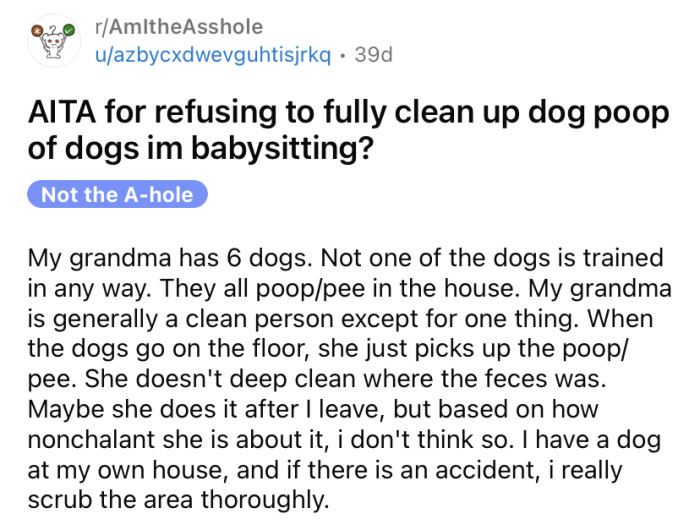
The OP was looking after the dogs for two weeks, and they were pooping and peeing everywhere.

The Redditor explained that the dogs need to be watched closely when they go outside, and they will eat their poop if it's not picked up immediately.
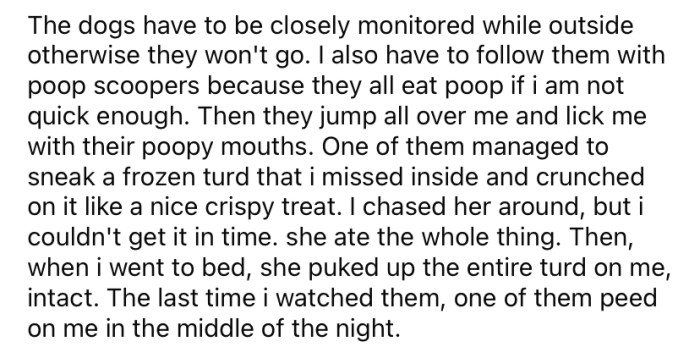
The Psychological Impact of Responsibility
The reluctance to clean up after the grandmother's dogs highlights psychological themes of responsibility and emotional burden.
From a psychological perspective, individuals may experience guilt or resentment when they feel obligated to take on responsibilities that seem unfair.
This dynamic can create internal conflict, particularly when others in the family do not share the same sense of obligation.
During the day, the dogs are let out every couple of hours, but they still poop inside.
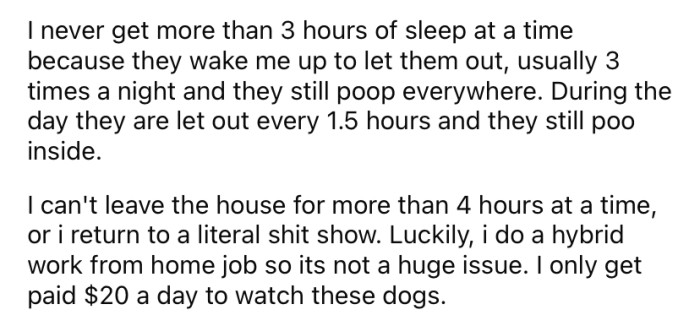
The OP says she only does it to help out her grandma since she can't afford to pay a professional.

The Redditor's sister says she's an a**hole for not cleaning up after them more thoroughly.
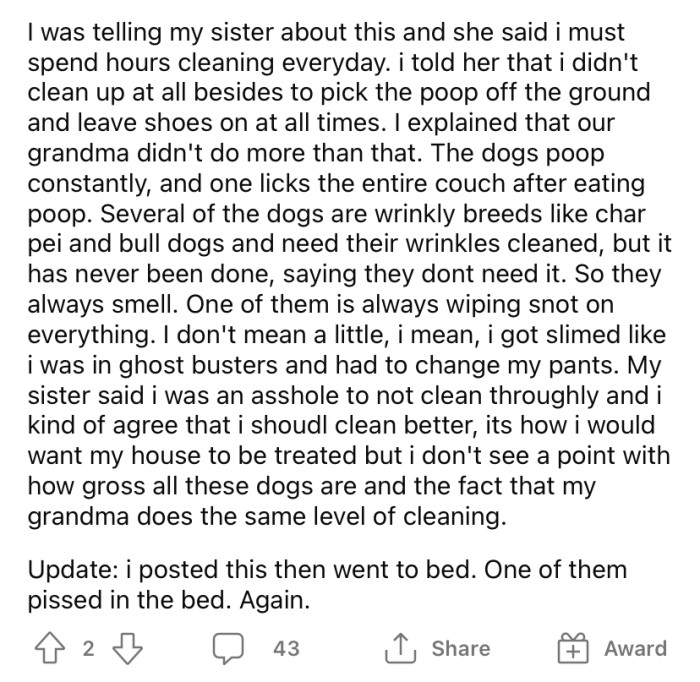
Research from Dr. William Doherty, family therapist, emphasizes that perceived inequities in family responsibilities can lead to significant resentment and conflict. He states, "When one family member feels overburdened, it can create a cycle of negative emotions that deeply affect family dynamics." Recognizing these feelings is crucial, as it can be the first step toward fostering a more equitable distribution of responsibilities within the family.
Here's how people reacted.
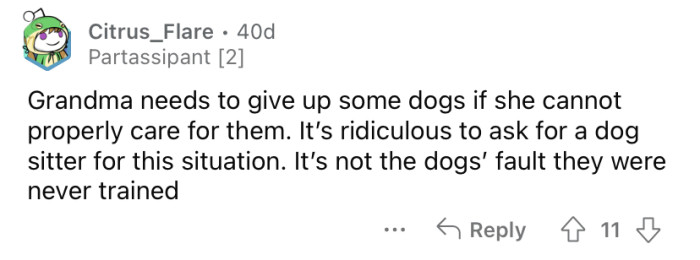
"An actual nightmare."

"The dogs need to be rehomed."

Boundaries and Family Dynamics
This situation underscores the importance of setting boundaries in family relationships.
Studies show that clear boundaries can help manage expectations and reduce feelings of overwhelm.
When family members communicate their limits effectively, it can lead to healthier interactions and reduce stress.
Textbook abuse and neglect.

"Poo borne illnesses."

"Why won't she housetrain them?"
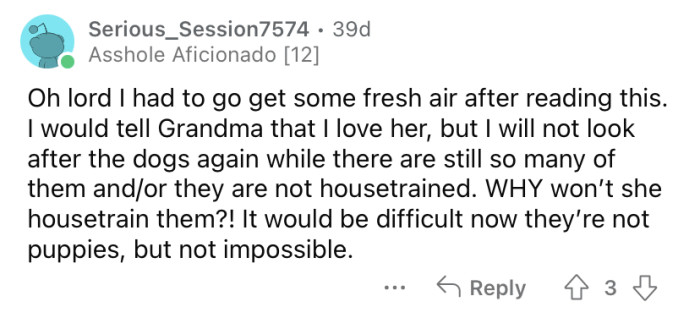
A behavioral psychologist would suggest having a family meeting to discuss responsibilities openly.
Engaging in conversations about shared tasks can foster understanding and collaboration among family members.
Research indicates that collaborative decision-making can enhance family cohesion and satisfaction.
"Gross."

"Stop dog-sitting for her."

"Disgusting."

Creating a Culture of Cooperation
To improve family dynamics, it’s essential to create a culture of cooperation around shared responsibilities.
Establishing clear expectations for each family member can reduce feelings of unfairness and resentment.
Research shows that families who actively engage in planning roles and responsibilities are more likely to succeed in maintaining harmony.
"Please get those poor dogs out of there."

"A massive health hazard."
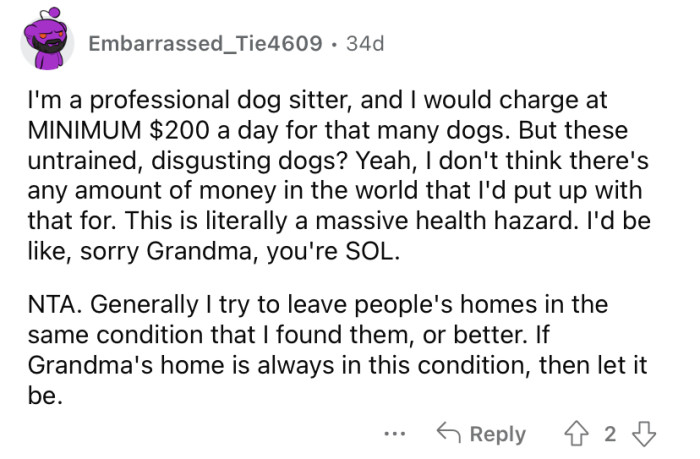
Well, this was an interesting story. What's your take on this situation?
Do you think the OP is being an a**hole for not deep cleaning after the dogs, or is it understandable that she would only do the bare minimum?
We would love to hear your opinions on this. You can share your thoughts with us in the comment section.
Additionally, recognizing and validating each family member's feelings toward shared responsibilities can foster empathy and understanding.
Practicing active listening and open dialogue can create a supportive environment where everyone feels valued.
Ultimately, fostering a culture of cooperation can lead to healthier family dynamics.
Psychological Analysis
This situation illustrates the challenges of managing family responsibilities, particularly when they feel inequitable.
When one family member feels burdened, it can lead to significant emotional strain. Encouraging open discussions about responsibilities can help foster a more balanced and cooperative family dynamic.
Analysis generated by AI
Analysis & Alternative Approaches
In conclusion, the conflict surrounding responsibility for the grandmother's dogs highlights important themes of obligation and boundaries in family dynamics.
By fostering open communication and cooperation, families can navigate these challenges more effectively.
Understanding the psychological principles at play can lead to healthier relationships and a more harmonious family environment.



